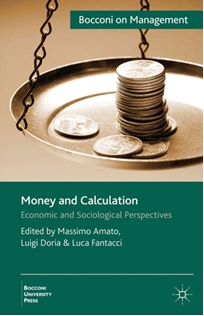Shuxiu Zhang follows the journey that money is taking, looking at a series of essays that discuss the shift away from its traditional role as currency towards an object of calculation intended for the elimination of market uncertainties.
Money and Calculation: Economic and Sociological Perspectives. Edited by Massimo Amato, Luigi Doria & Luca Fantacci. Published by Palgrave MacMillan. Published September 2010.
- Google Books (no preview)
- Amazon
- Publisher
 Aiming to make clear the links between money, calculation and management, this collection of essays investigates how calculative tools, practices and agencies come to shape economic structures and behaviours. The assumption here is that all dimensions of management are pervaded by an urge to measure everything, and this is particularly true in times of political or economic crisis. Based on studies from a range of scientific domains, the authors argue that money is gradually shifting away from its traditional role as a means of payment, to become an object of calculation on the financial markets that is intended for the elimination of market uncertainties.
Aiming to make clear the links between money, calculation and management, this collection of essays investigates how calculative tools, practices and agencies come to shape economic structures and behaviours. The assumption here is that all dimensions of management are pervaded by an urge to measure everything, and this is particularly true in times of political or economic crisis. Based on studies from a range of scientific domains, the authors argue that money is gradually shifting away from its traditional role as a means of payment, to become an object of calculation on the financial markets that is intended for the elimination of market uncertainties.
Within this context, the book has two main purposes: firstly, to investigate from various viewpoints how calculation and money bear upon the meaning of measure in economic life; and secondly, to explore whether the natures of money and calculation are mutually bound by a constitutive co-belonging. Ultimately, the book argues that any understanding of the key dimensions of economic life continuously involves interpretations of the relationship between money and calculation.
A key strength of this book is its range of scope and the plurality of its interpretative perspectives: the book was built on a dialogue between different scientific backgrounds, ranging from economics (Jean Cartelier, Yuri Biondi, Massimo Amato, Luca Fantacci, Dick Bryan and Michael Rafferty) to anthropology (Luigi Doria, Bill Maurer) and sociology (Herbert Kalthoff, Uwe Vormbusch, Alex Preda).Those studying in the field of finance will certainly recognise this impressive collection of authors, and the diversity in perspectives on the nexus between money and calculation is the book’s most valuable contribution to social sciences literature.
However, it also suffers from an illogical structural organisation. It is clear that the editors sought to organise the essays into three sections according to the disciplinary orientation, but this, unfortunately, tripped up the direction of the book and in several cases caused unnecessary repetition. The book also lacked a conclusion chapter which, given the multiplicity of arguments presented by authors from different disciplines, was more than disappointing. Without an explanation of how the different arguments integrate and interact, the book ended on confusing, incomplete, and almost neglectful terms.
In so far as the book’s relevance to the studies of finance, sociology, and anthropology, each chapter should be evaluated individually. Amato’s chapter on language, while presenting an interesting argument, is inadequate to the point of irrelevance. Conversely, the chapter by Kalthoff and Vormbusch on portfolio management is a sound work, but of peripheral subject interest. The ideas of Maurer on financial derivatives, and Doria on money as resources, are both commendable. Overall though, an informative and original read which provides those working in the field of finance with interesting alternative perspectives on the handling of money, while readers of sociology and anthropology may find the book beneficial for learning about how their work relates to financial issues.
Shuxiu Zhang is a PhD student in International Relations at LSE.




